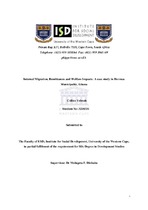Internal migration, remittances and welfare impacts : a case study in Dormaa Municipality, Ghana
Abstract
This study examines internal migration, remittances and welfare impacts among migrant households in the Dormaa Municipality in the Brong Ahafo Region of Ghana. Data were gathered though a questionnaire survey among 202 migrant households and in-depth interviews with 8 of them and some key informants. The findings were analysed largely based on the Push-Pull theory and New Economics of Labour Migration Theory. The findings of the study indicate that an overwhelming majority of migrant households reported an improved welfare as a result of having a migrant in their household who have moved away to other communities during the last 10 years and have been away for the last six months or are expected be away for six months or more. Majority of these migrants sent remittances back to their families left behind, either in the form of cash or goods. More males migrate than females,which is consistent with the general tendency for males to migrate more than females. The age category with the highest proportion of migrants was 30-39 years. Many of the migrants moved to another town or village in Ghana for work-related reasons, notably job transfer, work, or seek work/better work. The migrants themselves were the main people who made the decisions to migrate followed by spouses, parents and siblings, lending support to the collective decision making within households. Also, most of the migrants had some connections or contacts at their most recent migration destinations. A lot of the migrants relied on their personal savings to finance their migration whilst others received funds from family members and banks to finance their migration. The study recommend that government should make efforts to monitor remittance flow in Ghana and also increase awareness about the importance of remittance for the national and household economy. Further, there is the need to scale up education on social attitudes and discourses about internal migration and policy initiatives on remittance management in Ghana.

